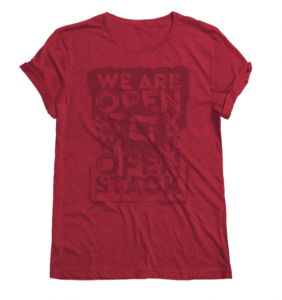Thanks for voting on your favorite OpenStack swag designs yesterday! See the second set of designs below, then head over to Twitter to vote on this round.
Check Twitter on Monday to see the winning designs!
We Are OpenStack:


Thanks for voting on your favorite OpenStack swag designs yesterday! See the second set of designs below, then head over to Twitter to vote on this round.
Check Twitter on Monday to see the winning designs!
We Are OpenStack:

The OSF Swag Store is coming soon, but first, we need your help!
Which of the below designs is your favorite? Tell us know in our Twitter poll and check back tomorrow for another round.
Important Vancouver Summit Updates
The countdown is on until the next Summit in May. Below are some important updates regarding CFP, Travel and Summit Passes
Call for presentations are now open for the Vancouver Summit. The deadline to submit your proposal is February 8th.
There are some new changes to the structure of the CFP, such as track organisation. Read more here.
These sold quick in 2015 when we last went to Vancouver, don’t miss out and secure yours today. You can do so here.
For information regarding Visa applications and invitation letters, read about it here.
As a general planning guideline, if a visa is needed, a foreign traveler should apply for his or her visa as soon as possible, preferably no later than 60 days before the travel date.
The Travel Support Program (TSP) aims to facilitate participation of key contributors to the OpenStack Summit by covering the costs for their travel and accommodations. The grants will cover a combination of flights, accommodation, and access pass to the Summit. More details here.
All contributors to OpenStack (developers, documentation writers, organizers of user groups around the world, Ask moderators, speakers, translators, etc) are invited to submit a request. You can apply by filling out this form.
Got any other questions about the Summit? There is an excellent FAQ here.
Ops Meetup Tokyo
The next OpenStack Ops Meetup is happening March 6-7 in Tokyo.
Project Teams Gathering (PTG)
The Project Teams Gathering (PTG) in Dublin February 26 – March 2. It’s an event for anyone who self-identifies as a member in a specific given project team as well as operators who are specialists on a given project and willing to spend their time giving feedback on their use case and contributing their usage experience to the project team.
Upcoming Industry Events
FOSDEM
The Foundation will be present at FOSDEM in Brussels, February 3-4 2018.
OpenStack booth will be in building K, level 1
OpenStack delivers a keynote at Chaosscon
Feb 2, 2018 in Brussels
http://grimoirelab.github.io/con/
Upcoming CFP
Closing date: January 21, 2018
Closing Date: January 30, 2018
LinuxCon ContainerCon | CloudOpen China
Closing Date: March 4, 2018
Closing Date: June 24, 2018
OpenStack Technical Committee E-office Hours
The TC has e-office hours each week to field any questions you may have.
Find out more details here:
https://governance.openstack.org/tc/
Summit recap
With 2300+ attendees and 54 countries represented, it was a fantastic week in Sydney. Thank you to all who attended!
You can catch all the action from the Keynotes here. The Summit talk videos are live, find them here. Superuser also covered the Summit with an awesome article covering 50 things you need to know.
Next Summit
Our next Summit destination is in Vancouver. Registration and Hotel booking are now available. Last time we went to Canada, these sold out quick. Don’t miss out and secure yours today.
Congratulations to SuperUser award winners!
On the final day of the Sydney Summit, the Community Contributor Awards gave a special tip of the hat to those who might not know how much they are valued. Read more about the ceremony here.
Stay tuned to Superuser and OpenStack’s social channels for when nominations open for Vancouver.
2018 CFP dates
Cloud Native Con/KubeCon Europe
Closing date: January 12, 2018
Closing date: January 14, 2018
Closing date: January 21, 2018
Closing Date: January 30, 2018
LinuxCon ContainerCon | CloudOpen China
Closing Date: March 4, 2018
Closing Date: June 24, 2018
Superuser articles of interest
Some fantastic Superuser articles have been published in recent weeks. They include tutorials, information about a new working group and project updates.
Making your first contact with OpenStack
Check out these OpenStack project updates
Working together: OpenStack and Kubernetes
Travel grants support global community to attend OpenStack Summit
How to use OpenStack Glance Image Import
Launch of Kata Containers
The Foundation is excited to announce Kata Containers. This project unites the security advantages of virtual machines with the speed and manageability of containers for running container management tools directly on bare metal without sacrificing workload isolation. Kata Containers delivers increased performance, faster boot time and cost efficiencies. Kata Containers will have its own governance, community and communication channels.
To find out more and get involved:
Sign up for Kata Containers updates at katacontainers.io
Get involved on the Kata Containers Mailing List, Slack* and IRC* (#kata-dev)
Follow Kata Containers on Twitter: @katacontainers
HPC book update
The Scientific Working Group has updated the Crossroads of Cloud and HPC: OpenStack for Scientific Research. Version 2 of the popular book details multiple enhancements made to OpenStack for HPC workloads over the past year and added several new in-depth case studies on how OpenStack supports radio astronomy, bioinformatics, cancer and genome research and more. Read or order the book at https://www.openstack.org/science/ to find out exactly how OpenStack allows researchers to spend less time managing infrastructure and more time on research that matters. To learn more or get involved in the Scientific Working Group, visit https://wiki.openstack.org/wiki/Scientific_SIG
THANK YOU!
It has been a fantastic 2017!!! Thank you to all community members for your industrious efforts and contributions! Wish you all a Happy Holiday break and a great New Year.











